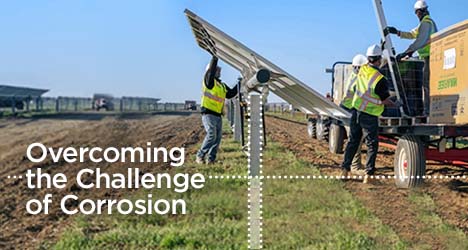Working with EPCs — End-to-End Renewable Energy Engineering Learn More
Preventing corrosion on utility-scale solar projects

Corrosion is an issue that needs to be evaluated on any solar project, and it’s becoming a more critical consideration. Steel is a key material in photovoltaic arrays. It corrodes over time, with the degree of corrosiveness of the soil being a primary consideration. Blymyer Engineers takes the issue seriously, and our team is up to date with the latest requirements. The team studies the topic proactively in order to provide clients with insight into how to manage corrosion issues on their projects.
Turning to sites with corrosive soil
Many prospective solar sites today have a level of corrosiveness that would have led developers to avoid them in the past. That’s because many of the prime lands for utility-scale solar projects are already in use, especially in California. The need to expand solar generation is inspiring developers to give less-than-ideal sites a closer look.
“We’re running out of good soil and friendly landscapes for utility-scale projects,” says Greg Mazur, director of engineering at Blymyer. “The Blymyer team is focused on engineering solutions that help customers overcome the challenge of corrosion. We take a practical approach, with our team designing projects to resist corrosion over the operating length of the project.”
Stas Gorbis, Blymyer Director of Commercial and EV Operations, adds: “The more corrosive the soil at the site, the more you need to do to protect the steel pile that comes into contact with the soil. That’s the area where corrosion is the biggest concern.”
Overcoming the corrosion challenge on solar projects
Soil tests provide a foundation for understanding the extent of the corrosion challenge at a potential utility-scale solar site. The Blymyer team studies the results of the tests, and designs appropriate solutions. We also work with corrosion consultants. These specialists review designs and provide steel corrosion reports. Solutions for corrosion include:
● Epoxy coatings: Resins that cure and harden to protect against corrosion.
● Galvanization: A process that uses zinc as a protective coating over steel or iron.
● Cathodic protection: A additional steel that acts as an anode while the protected metal is the cathode; the anode corrodes instead of the cathode.
● Additional Steel: A larger section of steel pile may be used to account for the loss due to corrosion
“You want steel piles to last throughout the operational life of the projects they support,” says Mazur. “We’re keeping up to date on the latest corrosion-related technology, techniques, and material advances. Our team also works with specialists to add an extra layer of certainty for clients.”